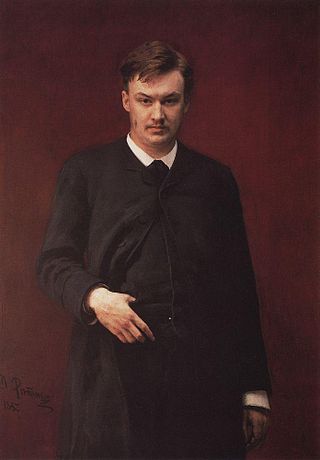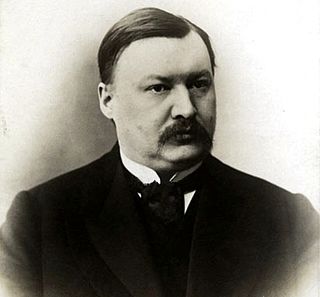Related Research Articles

Andrei Arsenyevich Tarkovsky was a Soviet film director and screenwriter. He has been widely considered one of the greatest directors in cinema history. His films explore spiritual and metaphysical themes and are known for their slow pacing and long takes, dreamlike visual imagery and preoccupation with nature and memory.

Nikolai Andreyevich Rimsky-Korsakov was a Russian composer, a member of the group of composers known as The Five. He was a master of orchestration. His best-known orchestral compositions—Capriccio Espagnol, the Russian Easter Festival Overture, and the symphonic suite Scheherazade—are staples of the classical music repertoire, along with suites and excerpts from some of his fifteen operas. Scheherazade is an example of his frequent use of fairy-tale and folk subjects.

Alexander Konstantinovich Glazunov was a Russian composer, music teacher, and conductor of the late Russian Romantic period. He was director of the Saint Petersburg Conservatory between 1905 and 1928 and was instrumental in the reorganization of the institute into the Petrograd Conservatory, then the Leningrad Conservatory, following the Bolshevik Revolution. He continued as head of the Conservatory until 1930, though he had left the Soviet Union in 1928 and did not return. The best-known student under his tenure during the early Soviet years was Dmitri Shostakovich.
Glazunov is a Russian surname that may refer to:

Les Sylphides is a short, non-narrative ballet blanc to piano music by Frédéric Chopin, selected and orchestrated by Alexander Glazunov.

Ilya Sergeyevich Glazunov was a Soviet and Russian artist from Saint Petersburg. He was the founder of the Russian Academy of Painting, Sculpture and Architecture where he also served as a rector up until his death. He held the title of People's Artist of the RSFSR.

The Violin Concerto in A minor, Op. 82, by Alexander Glazunov is one of his most popular compositions. Written in 1904, the concerto was dedicated to violinist Leopold Auer, who gave the first performance at a Russian Musical Society concert in Saint Petersburg on 15 February 1905. The British premiere of the concerto followed just over a year later, under the direction of Sir Henry Wood and with Mischa Elman as soloist. The American premiere of the work was not until 27 October 1911. It was performed by Efrem Zimbalist at his American debut with the Boston Symphony Orchestra.
The Symphony No. 4 in E-flat major, Op. 48, was written by Alexander Glazunov in 1893. The symphony was a departure from Glazunov's three earlier symphonies, which were based on nationalistic Russian tunes and, according to the composer, allowed him to give "personal, free, and subjective impressions of myself."

Andrei Fyodorovich Kazusenok is a Belarusian judoka and sambist.
Testimony is a 1988 British independent musical drama film directed by Tony Palmer and starring Ben Kingsley, Sherry Baines and Robert Stephens. The film is based on the memoirs of Dmitri Shostakovich (1906–1975) as dictated in the book Testimony and filmed in Panavision.
Alexander Glazunov composed his Piano Concerto No. 1 in F minor, Opus, 92, in 1911, during his tenure as director of the St. Petersburg Conservatory. The concerto is dedicated to Leopold Godowsky, whom Glazunov had heard on tour in St. Petersburg in 1905.
Alexander Glazunov composed his Symphony No. 3 in D major, Op. 33, in 1890, and it was published by 1892 by the Leipzig firm owned by Mitrofan Belyayev. The symphony is dedicated to Pyotr Ilyich Tchaikovsky and was first performed in St. Petersburg in December 1890 under the baton of Anatoly Lyadov. The symphony is considered a transitional work, with Glazunov largely eschewing the influences of Balakirev, Borodin, and Rimsky-Korsakov inherent in his earlier symphonies for the newer influences of Tchaikovsky and Wagner. Because of this change, the Third has been called the "anti-kuchkist" symphony in Glazunov's output. He would tone down these new influences in his subsequent symphonies as he strove for an eclectic mature style. The Third also shows a greater depth of expression, most evident in the chromatic turns of its third movement, reminiscent of Wagner's opera Tristan und Isolde.
The Symphony No. 7 in F major, Pastoral, Op. 77, was completed by Alexander Glazunov on July 4, 1902. It is dedicated to Mitrofan Belyayev.

Alexander Borodin's Scherzo in A-flat major is a lively piece written in 1885, while Borodin was in Belgium for an early performance of his then incomplete opera Prince Igor. It was originally written for solo piano, but in 1889 Alexander Glazunov orchestrated it, along with the Petite Suite. Borodin dedicated the piece to Théodore Jadoul, who made a four-hand piano arrangement of it.

Ilgar Yasharovich Mammadov is a Soviet and Russian of Azerbaijani origin who serves as President of the Russian Fencing Federation, and a former fencer. He is a two-time Olympic and one time world champion in team foil.

The Nikolai Rimsky-Korsakov Memorial Museum-Apartment is a branch of the St. Petersburg State Museum of Theatre and Music.
The Symphony No. 6 in C minor, Op. 58, was composed by Alexander Glazunov in 1896, and was published two years later. It is dedicated to Sigismond Blumenfeld, brother of the composer Felix Blumenfeld.

Commemorative Cantata for the Centenary of the Birth of Pushkin, Op. 65, is a cantata by Alexander Glazunov, composed in 1899 in memory of author Alexander Pushkin. It is also known as Memorial Cantata and Cantata in Memory of Pushkin's 100th Birthday. The work in five movements on lyrics by Konstantin Romanov is scored for solo voices, choir and piano.
Glazunov Glacier is a glacier flowing north into Stravinsky Inlet from Monteverdi Peninsula, Alexander Island. The glacier was named by the USSR Academy of Sciences in 1987 after Alexander Glazunov (1865-1936), a Russian composer.
The Law of Life is a 1940 Soviet drama film directed by Boris Ivanov and Aleksandr Stolper and starring Daniil Sagal, Aleksandr Lukyanov and Oswald Glazunov. Despite its strong endorsement of communist ideology, the film was fiercely attacked in Pravda and withdrawn from release.
References
- "Andrei Glazunov". Archived from the original on 2008-11-19. Retrieved 2008-03-22.